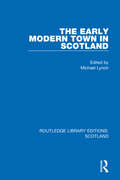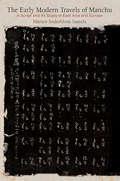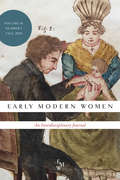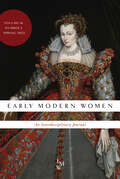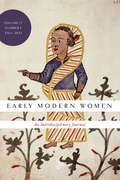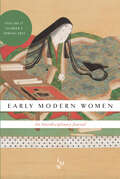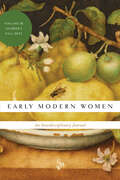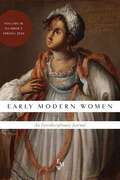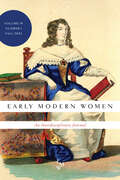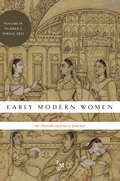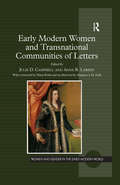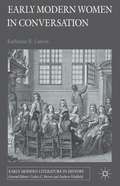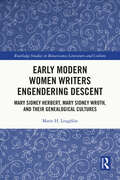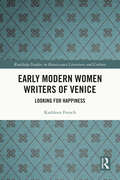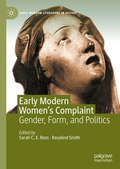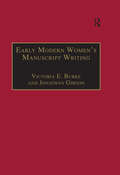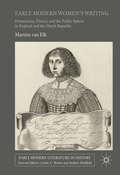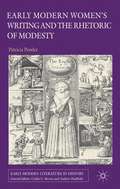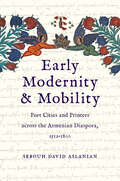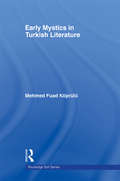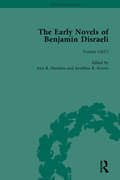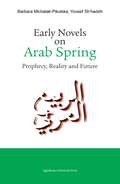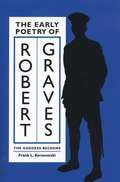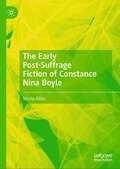- Table View
- List View
The Early Modern Town in Scotland (Routledge Library Editions: Scotland #16)
by Michael LynchOriginally published in 1987, this volume filled a notable gap in Scottish urban history and considers the place of Scottish towns in urban life during the 16th and 17th Centuries. The first part of the book is based on studies of individual burghs (Aberdeen, Dundee, Edinburgh and Perth) drawing extensively on archival material. The second part includes a discussion of the pressure put upon the burghs by the town between 1500 and 1650, a process which contributed to the destruction of the medieval burgh and examines the burgh during the Scottish Revolution. The impact of war and plague on Scottish towns in the 1640s is also analysed and much emphasis is given to the relationship between town and country.
The Early Modern Travels of Manchu: A Script and Its Study in East Asia and Europe (Encounters with Asia)
by Mårten Söderblom SaarelaA linguistic and historical study of the Manchu script in the early modern worldManchu was a language first written down as part of the Qing state-building project in Northeast Asia in the early seventeenth century. After the Qing invasion of China in 1644, and for the next two and a half centuries, Manchu was the language of state in one of the early modern world's great powers. Its prominence and novelty attracted the interest of not only Chinese literati but also foreign scholars. Yet scholars in Europe and Japan, and occasionally even within China itself, were compelled to study the language without access to a native speaker. Jesuit missionaries in Beijing sent Chinese books on Manchu to Europe, where scholars struggled to represent it in an alphabet compatible with Western pedagogy and printing technology. In southern China, meanwhile, an isolated phonologist with access to Jesuit books relied on expositions of the Roman alphabet to make sense of the Manchu script. When Chinese textbooks and dictionaries of Manchu eventually reached Japan, scholars there used their knowledge of Dutch to understand Manchu.In The Early Modern Travels of Manchu, Mårten Söderblom Saarela focuses on outsiders both within and beyond the Qing empire who had little interaction with Manchu speakers but took an interest in the strange, new language of a rising world power. He shows how—through observation, inference, and reference to received ideas on language and writing—intellectuals in southern China, Russia, France, Chosŏn Korea, and Tokugawa Japan deciphered the Manchu script and explores the uses to which it was put for recording sounds and arranging words.
Early Modern Women: An Interdisciplinary Journal, volume 16 number 1 (Fall 2021)
by Early Modern Women: An Interdisciplinary JournalThis is volume 16 issue 1 of Early Modern Women: An Interdisciplinary Journal. Early Modern Women: An Interdisciplinary Journal (EMW) is the only journal devoted solely to the interdisciplinary and global study of women and gender spanning the late medieval through early modern periods. Each volume gathers essays on early modern women from every country and region by scholars from a wide range of academic disciplines including art history, cultural studies, music, history, languages and literatures, political science, religion, theatre, history of science, and history of philosophy.
Early Modern Women: An Interdisciplinary Journal, volume 16 number 2 (Spring 2022)
by Early Modern Women: An Interdisciplinary JournalThis is volume 16 issue 2 of Early Modern Women: An Interdisciplinary Journal. Early Modern Women: An Interdisciplinary Journal (EMW) is the only journal devoted solely to the interdisciplinary and global study of women and gender spanning the late medieval through early modern periods. Each volume gathers essays on early modern women from every country and region by scholars from a wide range of academic disciplines including art history, cultural studies, music, history, languages and literatures, political science, religion, theatre, history of science, and history of philosophy.
Early Modern Women: An Interdisciplinary Journal, volume 17 number 1 (Fall 2022)
by Early Modern Women: An Interdisciplinary JournalThis is volume 17 issue 1 of Early Modern Women: An Interdisciplinary Journal. Early Modern Women: An Interdisciplinary Journal (EMW) is the only journal devoted solely to the interdisciplinary and global study of women and gender spanning the late medieval through early modern periods. Each volume gathers essays on early modern women from every country and region by scholars from a wide range of academic disciplines including art history, cultural studies, music, history, languages and literatures, political science, religion, theatre, history of science, and history of philosophy.
Early Modern Women: An Interdisciplinary Journal, volume 17 number 2 (Spring 2023)
by Early Modern Women: An Interdisciplinary JournalThis is volume 17 issue 2 of Early Modern Women: An Interdisciplinary Journal. Early Modern Women: An Interdisciplinary Journal (EMW) is the only journal devoted solely to the interdisciplinary and global study of women and gender spanning the late medieval through early modern periods. Each volume gathers essays on early modern women from every country and region by scholars from a wide range of academic disciplines including art history, cultural studies, music, history, languages and literatures, political science, religion, theatre, history of science, and history of philosophy.
Early Modern Women: An Interdisciplinary Journal, volume 18 number 1 (Fall 2023)
by Early Modern Women: An Interdisciplinary JournalThis is volume 18 issue 1 of Early Modern Women: An Interdisciplinary Journal. Early Modern Women: An Interdisciplinary Journal (EMW) is the only journal devoted solely to the interdisciplinary and global study of women and gender spanning the late medieval through early modern periods. Each volume gathers essays on early modern women from every country and region by scholars from a wide range of academic disciplines including art history, cultural studies, music, history, languages and literatures, political science, religion, theatre, history of science, and history of philosophy.
Early Modern Women: An Interdisciplinary Journal, volume 18 number 2 (Spring 2024)
by Early Modern Women: An Interdisciplinary JournalThis is volume 18 issue 2 of Early Modern Women: An Interdisciplinary Journal. Early Modern Women: An Interdisciplinary Journal (EMW) is the only journal devoted solely to the interdisciplinary and global study of women and gender spanning the late medieval through early modern periods. Each volume gathers essays on early modern women from every country and region by scholars from a wide range of academic disciplines including art history, cultural studies, music, history, languages and literatures, political science, religion, theatre, history of science, and history of philosophy.
Early Modern Women: An Interdisciplinary Journal, volume 19 number 1 (Fall 2024)
by Early Modern Women: An Interdisciplinary JournalThis is volume 19 issue 1 of Early Modern Women: An Interdisciplinary Journal. Early Modern Women: An Interdisciplinary Journal (EMW) is the only journal devoted solely to the interdisciplinary and global study of women and gender spanning the late medieval through early modern periods. Each volume gathers essays on early modern women from every country and region by scholars from a wide range of academic disciplines including art history, cultural studies, music, history, languages and literatures, political science, religion, theatre, history of science, and history of philosophy.
Early Modern Women: An Interdisciplinary Journal, volume 19 number 2 (Spring 2025)
by Early Modern Women: An Interdisciplinary JournalThis is volume 19 issue 2 of Early Modern Women: An Interdisciplinary Journal. Early Modern Women: An Interdisciplinary Journal (EMW) is the only journal devoted solely to the interdisciplinary and global study of women and gender spanning the late medieval through early modern periods. Each volume gathers essays on early modern women from every country and region by scholars from a wide range of academic disciplines including art history, cultural studies, music, history, languages and literatures, political science, religion, theatre, history of science, and history of philosophy.
Early Modern Women and Transnational Communities of Letters (Women and Gender in the Early Modern World)
by Julie D. Campbell Anne R. Larsen Diana Robin Margaret J. M. EzellAn important contribution to growing scholarship on women's participation in literary cultures, this essay collection concentrates on cross-national communities of letters to offer a comparative and international approach to early modern women's writing. The essays gathered here focus on multiple literatures from several countries, ranging from Italy and France to the Low Countries and England. Individual essays investigate women in diverse social classes and life stages, ranging from siblings and mothers to nuns to celebrated writers; the collection overall is invested in crossing geographic, linguistic, political, and religious borders and exploring familial, political, and religious communities. Taken together, these essays offer fresh ways of reading early modern women's writing that consider such issues as the changing cultural geographies of the early modern world, women's bilingualism and multilingualism, and women's sense of identity mediated by local, regional, national, and transnational affiliations and conflicts.
Early Modern Women in Conversation
by Katherine R. LarsonTo converse is, in its most fundamental sense, to engage with society. The potency of conversation as an early modern social networking tool is complicated, however, both by its gendered status in the period and by its conflation of verbal and physical interaction. Conversation was an embodied act that signified social intimacy, cohabitation, and even sexual intercourse. As such, conversation posed a particular challenge for women, whose virtuous reputation was contingent on sexual and verbal self-control. Early Modern Women in Conversation considers how five women writers from the prominent Sidney and Cavendish families negotiated the gendered interrelationship between conversation and the spatial boundaries delimiting conversational encounters to create opportunities for authoritative and socially transformative utterance within their texts. Conversation emerges in this book as a powerful rhetorical and creative practice that remaps women's relationship to space and language inearly modern England.
Early Modern Women Writers Engendering Descent: Mary Sidney Herbert, Mary Sidney Wroth, and their Genealogical Cultures (Routledge Studies in Renaissance Literature and Culture)
by Marie H. LoughlinFocusing on Mary Sidney Herbert and Mary Sidney Wroth’s use of the figures of origin, descent, and inheritance in their poetry and prose, this book examines how these central women writers situated themselves in terms of early modern England’s rich ancestral cultures, employing these and other genealogical concepts to talk about authorship, family, selfhood, and memory. In turn, both Sidney Herbert and Sidney Wroth also shaped their works in relation to the ways in which writers within their familial communities and literary coteries constructed them as Sidneys, heirs, descendants, and future ancestors, in genres ranging from the patronage dedication and pastoral eclogue to mythographic genealogia and georgic poetry. In the intersection of ancestry, death, sexuality, and reproduction, the book contends that Sidney Herbert and Sidney Wroth develop their authorship within the simultaneous rigidity and flexibility of their world’s genealogical discourses.
Early Modern Women Writers of Venice: Looking for Happiness (Routledge Studies in Renaissance Literature and Culture)
by Kathleen FrenchEarly Modern Women Writers of Venice: Looking for Happiness explores the ways in which five women used their writing to challenge misogynistic views about female inferiority, develop a sense of agency, and form meaningful interpersonal relationships that would enable them to find happiness. They are the forerunners of later feminist thinkers.This book is the first full-length study of the happiness of women in early modern Italy. It focuses on five women writers who lived in Venice between the late fifteenth century and the early seventeenth century. It takes an interdisciplinary approach that combines methodologies from literature, psychology, philosophy, history, religion, and emotion studies, emphasizing the importance of studying the search for happiness within a specific cultural context. It contributes particularly to feminist studies that consider gender in the context of ideology and the exercise of power. It also engages with current studies of emotions by approaching them from the perspective of research in the field of positive psychology and self-determination theory. It considers how the process of writing enabled women to achieve autonomy, what they thought about happiness, and the extent to which they were able to achieve it in their individual lives.
Early Modern Women's Complaint: Gender, Form, and Politics (Early Modern Literature in History)
by Sarah C. E. Ross Rosalind SmithThis collection examines early modern women’s contribution to the culturally central mode of complaint. Complaint has largely been understood as male-authored, yet, as this collection shows, early modern women used complaint across a surprising variety of forms from the early-Tudor period to the late-seventeenth century. They were some of the mode’s first writers, most influential patrons, and most innovative contributors. Together, these new essays illuminate early modern women’s participation in one of the most powerful rhetorical modes in the English Renaissance, one which gave voice to political, religious and erotic protest and loss across a diverse range of texts.This volume interrogates new texts (closet drama, song, manuscript-based religious and political lyrics), new authors (Dorothy Shirley, Scots satirical writers, Hester Pulter, Mary Rowlandson), and new versions of complaint (biblical, satirical, legal, and vernacular). Its essays pay specific attention to politics, form, and transmission from complaint’s first circulation up to recent digital representations of its texts. Bringing together an international group of experts in early modern women’s writing and in complaint literature more broadly, this collection explores women’s role in the formation of the mode and in doing so reconfigures our understanding of complaint in Renaissance culture and thought.
Early Modern Women's Manuscript Writing: Selected Papers from the Trinity/Trent Colloquium
by Jonathan GibsonBecause print publishing was often neither possible nor desirable for women in the early modern period, in order to understand the range of writing by women and indeed women's literary history itself, it is important that scholars consider women's writing in manuscript. Since the body of critical studies on women's writing for the most part prioritizes print over manuscript, this essay collection provides an essential corrective. The essays in this volume discuss many of the ways in which women participated in early modern manuscript culture. The manuscripts studied by the contributors originated in a wide range of different milieux, including the royal Court, the universities, gentry and aristocratic households in England and Ireland, and French convents. Their contents are similarly varied: original and transcribed secular and devotional verse, religious meditations, letters, moral precepts in French and English, and recipes are among the genres represented. Emphasizing the manuscripts' social, political and religious contexts, the contributors challenge commonly held notions about women's writing in English in the early modern period, and bring to light many women whose work has not been considered before.
Early Modern Women's Writing
by Martine Van ElkThis book is the first comparative study of early modern English and Dutch women writers. It explores women's rich and complex responses to the birth of the public sphere, new concepts of privacy, and the ideology of domesticity in the seventeenth century. Women in both countries were briefly allowed a public voice during times of political upheaval, but were increasingly imagined as properly confined to the household by the end of the century. This book compares how English and Dutch women responded to these changes. It discusses praise of women, marriage manuals, and attitudes to female literacy, along with female artistic and literary expressions in the form of painting, engraving, embroidery, print, drama, poetry, and prose, to offer a rich account of women's contributions to debates on issues that mattered most to them.
Early Modern Women’s Writing and the Rhetoric of Modesty
by Patricia PenderAn in-depth study of early modern women's modesty rhetoric from the English Reformation to the Restoration. This book provides new readings of modesty's gendered deployment in the works of Anne Askew, Katharine Parr, Mary Sidney, Aemilia Lanyer and Anne Bradstreet.
Early Modernity and Mobility: Port Cities and Printers across the Armenian Diaspora, 1512-1800
by Sebouh David AslanianA history of the continent-spanning Armenian print tradition in the early modern period Early Modernity and Mobility explores the disparate yet connected histories of Armenian printing establishments in early modern Europe and Asia. From 1512, when the first Armenian printed codex appeared in Venice, to the end of the early modern period in 1800, Armenian presses operated in nineteen locations across the Armenian diaspora. Linking far-flung locations in Amsterdam, Livorno, Marseille, Saint Petersburg, and Astrakhan to New Julfa, Madras, and Calcutta, Armenian presses published a thousand editions with more than half a million printed volumes in Armenian script. Drawing on extensive archival research, Sebouh David Aslanian explores why certain books were published at certain times, how books were sold across the diaspora, who read them, and how the printed word helped fashion a new collective identity for early modern Armenians. In examining the Armenian print tradition Aslanian tells a larger story about the making of the diaspora itself. Arguing that “confessionalism” and the hardening of boundaries between the Armenian and Roman churches was the “driving engine” of Armenian book history, Aslanian makes a revisionist contribution to the early modern origins of Armenian nationalism.
Early Mystics in Turkish Literature (Routledge Sufi Series)
by Mehmed Fuad KopruluThis book is a translation of one of the most important Turkish scholarly works of the twentieth century. It was the masterpiece of M.F. Koprulu, one of Turkey’s leading, and most prolific, intellectuals and scholars. Using a wide variety of Arabic, and especially Turkish and Persian sources, this book sheds light on the early development of Turkish literature and attempts to show the continuity in this development between the Turks and that of Anatolia. Early Mystics in Turkish Literature addresses this topic within the context of other subjects, including Sufism, Islam and the genesis of Turkish culture in the Muslim world. This is a major contribution to the study of Turkish literature and is essential reading for scholars of Turkish literature, Islam, Sufism and Turkish history.
The Early Novels of Benjamin Disraeli Vol 6
by Daniel Schwarz Geoffrey Harvey Ann Hawkins Miles Kimball Charles Richmond Michael SandersBenjamin Disraeli (1804-81) was one of the most important political figures in 19th century Britain. However, before rising to political prominence he had established himself as a major literary figure. This set takes a critical look at Disraeli's early work. Volume 6 includes Venetia (1837).
Early Novels on Arab Spring: Prophecy, Reality and Future
by Barbara Michalak-Pikulska Yousef Sh’hadehThe authors of this book present a study of the first Arab novels that dealt with the Arab Spring in the period 2011-2013. They show the rapid reaction of Arab novelists to what happened in their countries at that time. Dozens of narrative works have been published that heralded the advent of change and the victory of popular movements, glorifying the rebellious uprisings against tyrannical regimes. Few predicted the outbreak of the revolution before the occurrence of these major events. They also presented a comprehensive picture of what was going on in Arab societies during that difficult period. The revolutions left many victims, and for this reason pessimism and despair permeate some texts, but others paint a bright picture of the future of the Arab Spring, which may lead to the realization of the dream of freedom and democracy.The young generation, which by means of the internet and social media contributed to the outbreak of the revolution, is ready to fight for its own ideals and freedom. Its representatives are fascinated by the power of revolution and the rapid course of events. They boldly face death in the hope that the sacrifice of their lives will bring about a better future for their children. It was young people, not politicians and party leaders, who planned the revolution demanding freedom, dignity, equality and justice.
The Early Poetry of Robert Graves: The Goddess Beckons
by Kersnowski Frank L.Like many men of his generation, poet Robert Graves was indelibly marked by his experience of trench warfare in World War I. The horrific battles in which he fought and his guilt over surviving when so many perished left Graves shell-shocked and disoriented, desperately seeking a way to bridge the rupture between his conventional upbringing and the uncertainties of postwar British society. In this study of Graves's early poetry, Frank Kersnowski explores how his war neurosis opened a door into the unconscious for Graves and led him to reject the essential components of the Western idea of reality—reason and predictability. In particular, Kersnowski traces the emergence in Graves's early poems of a figure he later called "The White Goddess," a being at once terrifying and glorious, who sustains life and inspires poetry. Drawing on interviews with Graves's family, as well as unpublished correspondence and drafts of poems, Kersnowski argues that Graves actually experienced the White Goddess as a real being and that his life as a poet was driven by the purpose of celebrating and explaining this deity and her matriarchy.
The Early Post-Suffrage Fiction of Constance Nina Boyle
by Nicola AllenThis book offers the first comprehensive treatment of the fiction of Constance Antonina (Nina) Boyle: a suffragette described in one obituary as 'second only to Mrs Pankhurst'. Boyle was a well-known campaigner and was the first woman to stand for selection as a candidate in an election in the UK. However, her novels have been all but forgotten. This study explores Boyle's early fiction and focuses on her first five novels - each of which represents a retelling of established narratives. It explores how Boyle used her fiction to voice her radical gender politics within a culture that was becoming increasingly hostile to even discussing women's rights outside of the extension of the franchise. This book will be of interest to scholars of women's suffrage as well as anyone interested in popular fiction of the 1920s.
Early Postmodernism: Foundational Essays
by Paul A. BovéIn the decade that followed 1972, the journal boundary 2 consistently published many of the most distinguished and most influential statements of an emerging literary postmodernism. Recognizing postmodernism as a dominant force in culture, particularly in the literary and narrative imagination, the journal appeared when literary critical study in the United States was in a period of theory-induced ferment. The fundamental relations between postmodernism and poststructuralism were being initially examined and the effort to formulate a critical sense of the postmodern was underway. In this volume, Paul A. Bové, the current editor of boundary 2, has gathered many of those foundational essays and, as such, has assembled a basic text in the history of postmodernism.Essays by noted cultural and literary theorists join with Bové's contemporary preface to represent the important and unique moment in recent intellectual history when postmodernism was no longer seen primarily as an architectural term, had not yet come to describe the wide range of culture it does now, but was finding power and place in the literary realm. These essays show that the history of postmodernism and its attendant critical theories are both more complex and more deeply bound with literary criticism than often is acknowledged today. Early Postmodernism demonstrates not only the significance of these literary studies, but also the role played by literary critical postmodernism in making possible newer forms of critical and cultural studies.Contributors. Barry Alpert, Charles Altieri, David Antin, Harold Bloom, Paul A. Bové, Hélène Cixous, Gerald Gillespie, Ihab Hassan, Joseph N. Riddel, William, V. Spanos, Catharine R. Stimpson, Cornel West
